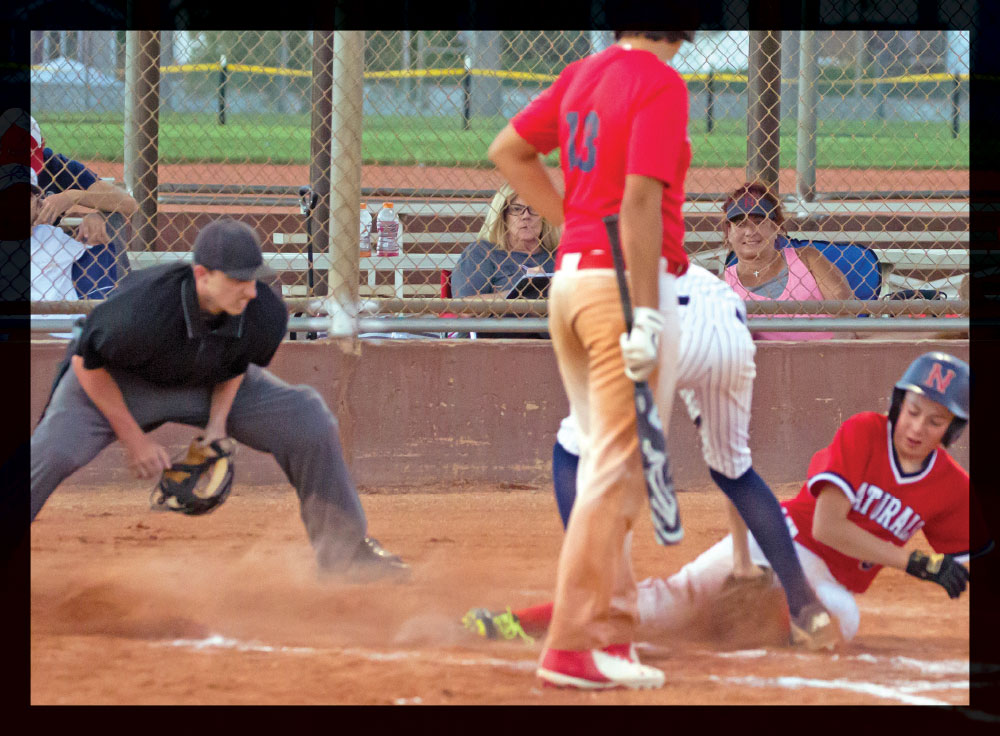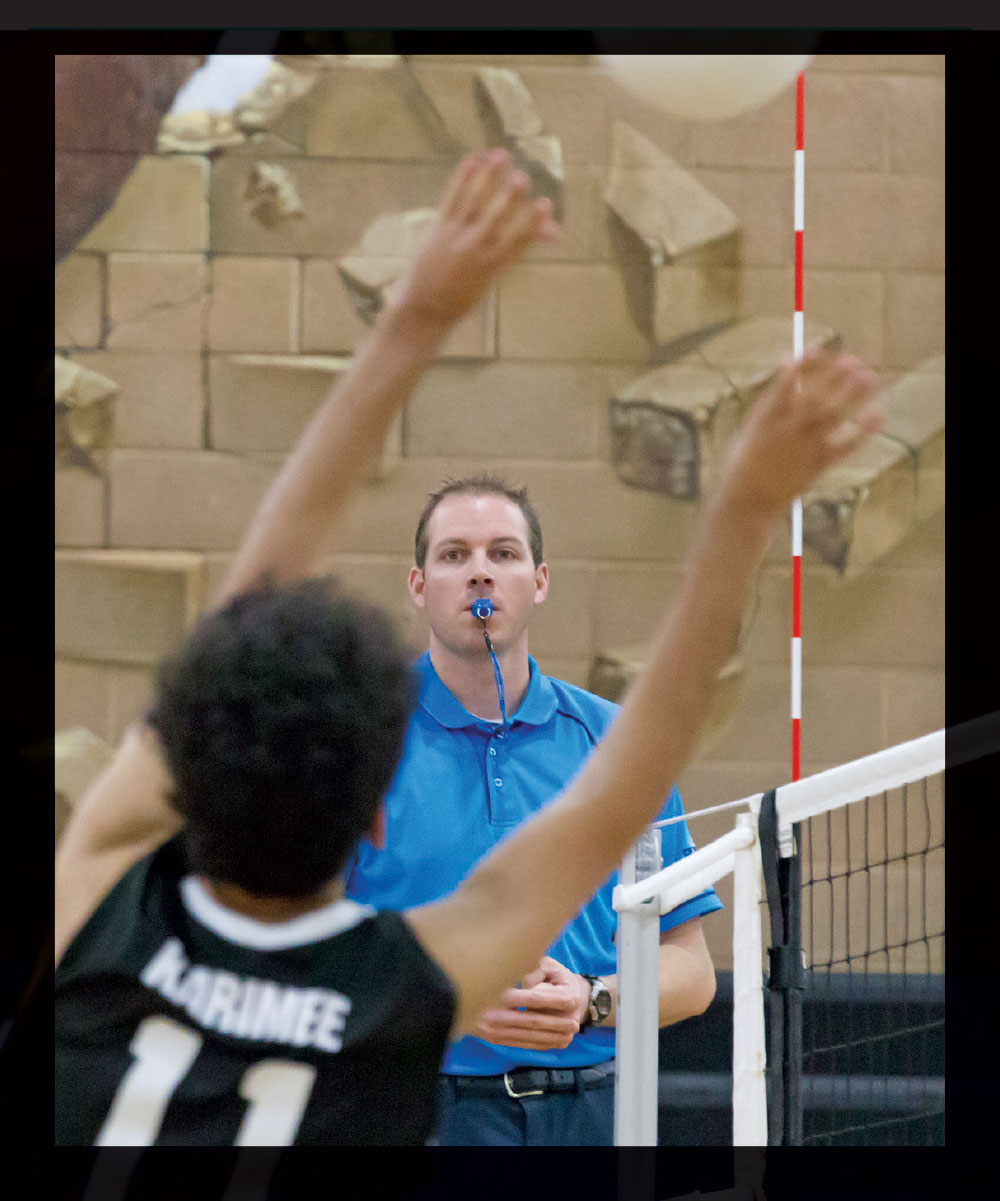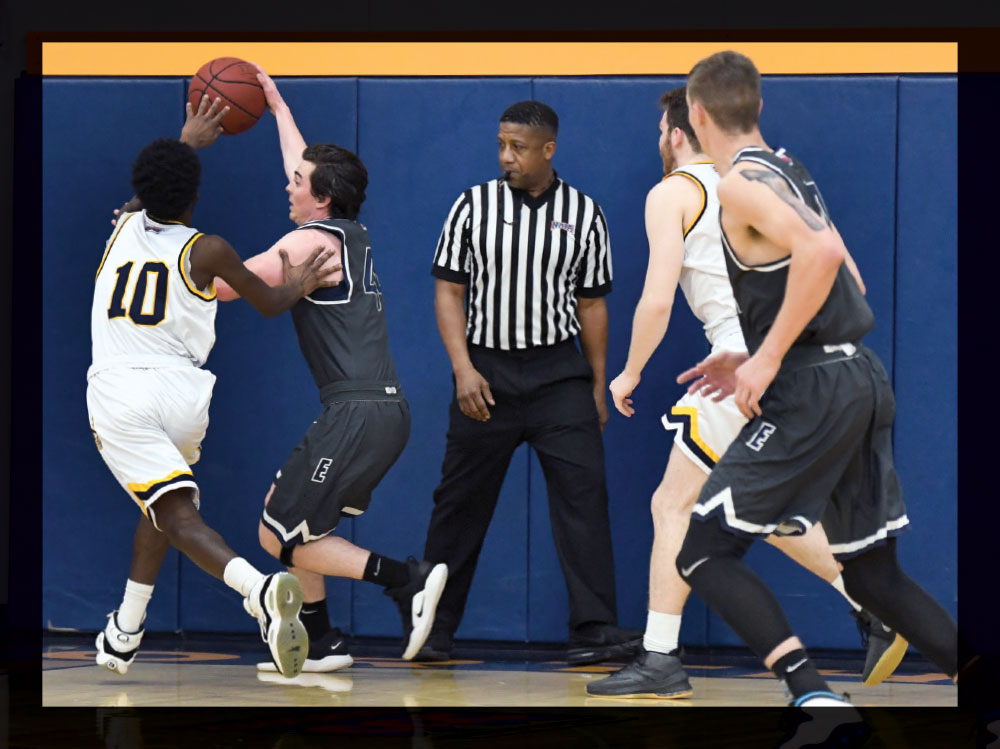How to develop the mental skills needed to thrive and advance in officiating.
By Karen Swanner
D
o you have the mental skills to become one of the top officials in your sport? Are you confident, motivated and do you know how to recognize and manage stress? This is the intangible side of officiating, and knowing how to manage your “mental game” can be the key to your success.
As a group, sports officials tend to be very confident; and we have to be, because we are called on to make split-second decisions under tremendous pressure that could potentially affect the outcome of the games we are officiating. We are motivated by many things to begin, stay in and leave the avocation and stressed out by even more. Recognizing these “intangibles,” and having the tools to cope, can be the keys to longevity and success.
It’s no secret that in order to be successful as a sports official you need to know the rules, be physically fit, pass written tests, have good assessments and be available when assigners need you. But what about the other side of the game that gives you the skills necessary to manage the contest and takes you from being a good official to a great one? Things like self-efficacy (confidence), motivation and stress management are rarely taught, infrequently addressed and can be the difference between success or failure in your performance in individual games — or your entire career.
To better see how self-efficacy, motivation and stress impact an official’s ability to officiate a game, I conducted a study of top-level high school soccer officials from the Missouri State High School Activities Association (MSHSAA), the Southern Illinois Soccer Officials Association (SISOA) and the Western New York High School Soccer Officials Association (WNYHSSOA).
The results showed that overall, high school soccer referees had a high level of confidence in themselves and their abilities. A referee’s confidence was examined based on game management, decision making, pressure and communication. Of these four areas, referees felt the most confident in their abilities to communicate and manage a game.
“You have to possess a certain innate level of self-confidence to be an effective official,” explained Steve Baum, an accomplished soccer and baseball official from New York. “Without it, you have no chance. It’s easy to sit in a lawn chair watching a game and confidently say that was a foul, or that a play was offside, or the runner was out at first, but this is not the same as when you blow your whistle or call the batter out. It’s an entirely different situation because now you own the call, and it takes some experience to figure that out.”
Experience, knowledge, preparation, social support and having a good mentor are some of the key factors that help officials gain confidence.
“Building confidence starts with repetition,” said Matt Bertram, a multi-sport official and former soccer player from Newburgh, Ind. “The more games an official does, the better feel they can get for the game. Going to camps and studying the game can build confidence as well, especially with less-experienced officials.”
The confidence of officials can determine the challenges they undertake, the effort they expend in the activity and their perseverance when facing difficulties. Having confidence as an official is a tremendous attribute, but when officials lack this confidence, it can lead to burnout, which is a reason why so many officials begin to referee with passion, but don’t stay very long in their role as officials.
With the great need to examine referee confidence, researchers have coined a new attributable confidence term just for officials: refficacy. This term was first developed in 2011 by researchers Felix Guillen and Deborah Feltz, who wanted to see the outcomes of referees who either have high or low referee efficacy. They defined refficacy as the “extent to which referees believe they have the capacity to perform successfully in their job.” They believe a referee’s level of refficacy is determined by experience, knowledge/education, support from others, physical and mental preparation, stress levels, the amount of athletic rule violations they face and the satisfaction of their performance both by themselves and the teams they officiate.
“You have to be confident when making calls or playing an advantage in a high school game because no matter what call you make, someone is going to disagree with you,” said Mark Lasley, an eight-year Illinois High School Association official and former coach.
“You can’t be wishy washy or doubting yourself. You have to be confident you made the right call.”
“A good deal of confidence comes with personality, skill and preparation, so part of that is experience,” said Joe Radzialowski, a USSF state and college official, who is a former member of MSHSAA. “Some confidence comes from acting the part; looking sharp, being fit and having good body language. Confident officials tend to stick around, therefore by surveying high-level and long-tenured referees, you seem to get the most confident population.”
“I think confidence is the sum of many learned coping techniques,” added John Bouc, a longtime IHSA official who also officiates college soccer. “You can learn all there is about how to give a red card for a DOGSO (denial of goal-scoring opportunity), but you can never really build up your confidence for giving one without having the game experience.”

Developing an understanding of confidence can help an official maintain or increase it. Through this self-examination, officials become aware of what they need as an individual to become and maintain the level of confidence necessary to be successful. Officials can watch videos of their own games to see what they have done well along with areas that need improvement.
Another approach officials can take is keeping a journal or “logging evidence.” By journaling, officials can reflect on things they did well and the evidence of situations where they exhibited confidence.
Lastly, officials can reinforce their abilities by reminding themselves of what they have accomplished, and focus on their strengths instead of weaknesses — and on long-term versus short-term improvements.
While nearly all the officials who participated in the study reported a high level of refficacy, a majority identified some specific factors that caused them stress during their matches. Officials were asked if they experienced stress from things like “receiving verbal abuse from coaches; making controversial calls, making incorrect calls, being out of position, making a mistake with mechanics or signals, having a problem with their partners or being sexually harassed.” The study found the No. 1 stressor for high school officials is making an incorrect call.
“While making an incorrect call can be very stressful,” Baum said, “having the confidence to admit your mistake usually goes a long way in defusing the situation.” Baum is talking about humility that comes with experience and knowledge. Being able to communicate and show resilience will also help with what happens after the call.
“Making an incorrect call is not only stressful, but can also lead to other things that stress you out even more,” said Steve Adamec, a 30-year official from western New York who has also officiated at the collegiate and professional levels. “That is when the dissent from coaches, players and fans begins. Sometimes that judgment from the outside, together with what you are thinking about how you just screwed up, can destroy your game. That is where confidence and experience come in, to get you past your own mistakes.”
“Sometimes when I make a bad call, I feel like the smallest person on Earth,” Bertram said. “When I get mentally prepared for a game I work on ‘the next play mentality’ and that is how I handle those situations.”
“I’ve been blessed with a massive ego and healthy mentality, so when I make a mistake, I regret it, but put it in the past,” Radzialowski said. “We are all going to receive external feedback when we make a mistake, but the referees who get really affected by it are the ones who can’t get it out of their head. If you are able to stay focused on the next play, the next minute, the remainder of the game, you can move past mistakes.”

Part of what Radzialowski is referring to is a stress-coping strategy called “Parking and Thought Stopping,” a technique officials can use to stop negative thoughts in their tracks, enabling them to continue officiating with confidence. This technique simply sets the negative thought or experience aside, using the word, “Stop.” Easier said than done, correct? A trick to getting refocused when this happens is to have a cue, which may be physical or mental, that puts positive thoughts back in your mind. Think of your loved ones, your successful career, a great game you had, a great call you made or something that makes you really happy. Or carry some physical remembrance with you which brings positive thoughts back in your head. This could be a photo you have in your pocket, a whistle from your first game, a lucky coin, a tattoo of something meaningful or anything that you can physically look at that brings you a positive feeling.
Early in my career, a former U.S. National Team goalkeeper and professional player gave me the following advice based on his experience: “In soccer, one of the few times the clock is stopped is when a goal is scored. The pressure is on the goalkeeper because everyone is looking at him wondering why he gave up the goal? If the game restarts and your focus is still on the goal you gave up, goal number two, three and four happen, and pretty soon the game is over. A negative mindset reduces your ability to perform whether you are a player or official in any sport. It’s like having a ‘monster in your closet’ which scares you, so you can no longer excel.
“Stop the monster in his tracks and go back to thoughts of when you made the right play or correct call,” the goalkeeper said. “You can address the mistakes you made when you review your game afterward and make adjustments then.”
Stress for referees can negatively affect their concentration, focus, effort and motivation, which can all lead to a negative physical performance. In other words, if your brain is in overload, you will continue to make mental mistakes and you cannot perform physically either. This is one of the main reasons why the intangibles are such an important part of referee training. Referees not only need to be able to recognize the physical and emotional reactions their body has to stress, but also be able to use the tools to cope with these stressors when they arise. Often, the body’s physical and mental reactions (including a racing heart or upset stomach due to fear or agitation) work together negatively and the result is a lack of concentration, lack of focus and lack of effort.
Actions that produce stress, like judgment calls and decisions about rule infractions, are predominant and inevitable. Referees are expected to make split-second, accurate decisions in highly competitive environments. For example, elite soccer referees can make three to four split-second decisions per minute. This large number of decisions, coupled with time constraints, creates a very taxing atmosphere for officials for an extended period of time. As a result, referees often become both physically and mentally exhausted, depending on the amount of stress they face during their match.
The study found receiving verbal abuse from coaches, making a controversial call and being out of position were the next three factors from which officials felt the most stress, often coinciding with the stress related to making an incorrect call.
There are two types of preventive strategies that can assist an official to cope with stress: problem-focused and emotion-focused. Problem-focused strategies center around planning, preparation, seeking support from peers or mentors and increasing knowledge or effort. Emotion-focused strategies are used to reduce stress in a perceived stressful situation and use similar techniques. They include seeking support from peers, emotional venting, reducing the number of games or putting yourself in a less stressful position — like accepting assignments that suit your abilities — and self-talk, which focuses on a positive outcome.

With high levels of stress reported by the officials in this study, why would anyone want to have a career or hobby as a sports official?
Officials from all sports reported similar motivations for wanting to officiate, including being a former player and wanting to continue to stay in the game; a desire to give back; an opportunity to challenge themselves; a way to get fit; a way to enjoy their free time; the excitement of the game; personal growth, to gain recognition; needing a second job; and to form social relationships.
Some of the above examples come from intrinsic motivation, which means doing something simply for the fun, enjoyment and satisfaction of it. In this instance, it may mean the person starts to officiate for the “love of the game.” A former player or coach, parents who want to experience soccer with their children, or fans who are passionate about the sport, but don’t have the skill to play, typically undertake an officiating role. Officials who stay intrinsically motivated will continue to enjoy their role, the sport and will inherently hone their skills, which may lead to increased advancement.
“The No. 1 reason I decided to officiate was for the opportunity to stay around the game and get paid to stay fit,” said Jason Wyland, a former Division I player and college coach who became an MSHSAA official in 2019. “I love to run and I get paid to be part of a game I love.”
Lasley expressed similar views. “I have always enjoyed the game and wanted to see it from a perspective of both a player and a referee,” he said. “Later, when I started to coach, I could relate to each of those views on the field. After years of being involved, I can anticipate what players are going to do before they do it and I know what reactions to expect from coaches when I am making a call.”
Dr. Arthur Langston, a former wrestler who spent 15 years as a wrestling coach and seven years as an official, explained he also started officiating because he wanted to give something back.
“I wanted to stay involved in a sport that taught me about discipline, responsibility and how to rely on myself,” said Langston, who is from Troy, Ill. “The culture in this sport is not always as professional as it could be and I thought I could be a good role model.
“The toughest part about officiating wrestling is that it is an individual sport. So it’s all on you. When you are constantly being negatively critiqued by parents, coaches and fans, that can wear on you and demotivate you. However, I was lucky enough to have a mentor who would pull me aside and say, ‘Let’s talk about it.’ If all the critique you ever get is from coaches and fans, that’s tough. But if you can get critiques from someone who lives and breathes it when you have moments of uncertainty, you can continue to be confident and motivated in your role.”
Having a mentor who has been an official and understands what one is experiencing is one of the key ingredients to keep officials motivated to stay involved in their sport. Making time to socialize or interact with crews off the field is another. There is nothing better than sharing stories with officials who are experiencing the same things as you in a social setting.
“Almost all of my friends are officials,” said Ricardo Segobiano, a collegiate official from Belleville, Ill. “I travel all over the country to officiate my sport and have formed great friendships with others who are as passionate about the sport as I am. I think sometimes I am just as motivated by the social aspect as I am by the game itself. There is nothing I like better than to officiate a highly contested game, then sit around with officials afterward and talk about it.”
Extrinsic motivation, on the other hand, is the official who officiates because of perceived outcomes, which could be in the form of approval, upward mobility, money, meeting goals, rewards and success. In the case of an extrinsically motivated referee, it may be someone who needs the money, wants to be the center of attention, wants to travel, be recognized or be in control, or is motivated by the value. Many referees experience both types of motivations throughout their careers. However, intrinsically motivated referees, who are happier and more satisfied with their experience as an official, tend to experience more longevity in their career. Personally, I began because I loved the game. However, the more challenges, travel, rewards and notoriety I received, the more it motivated me to continue for more than 35 years.
“The reason I will keep officiating is the desire to keep getting better at it,” added Wyland, who officiated at his first state finals in November 2019. “I think I have a combination of both types of motivation. I am beginning to get praise from my peers and continue to push myself to fix my mistakes, so that I can continue to get higher level games and be noticed by more people.”
No matter the task you are undertaking, nothing is more important than motivation. It is the fuel that ignites behavior through choice, effort and persistence. Officials may start out being motivated by passion, but officiating sports is often a thankless and stressful avocation. Therefore, other things that can help motivate officials to continue include praise, recognition, respect, relationships developed with peers, social growth, personal growth, achievement, increased knowledge, increased opportunity and advancement.
Officials organizations can also assist by providing training and education that keep officials both mentally and physically prepared. A job structure that allows for opportunities for advancement, fair and equitable pay, straightforward assigning policies, a mentoring program and accountability that is extended to coaches, players and fans are also tools for keeping officials motivated. Setting positive and realistic goals for ourselves will also keep us inspired.
With the lack of referee recruitment and retention a current issue, it is essential officials at all ages and skill levels be given tools to address the intangible areas of their game, which may lead to a more satisfying experience and increased longevity in the field.
What's Your Call? Leave a Comment:
Note: This article is archival in nature. Rules, interpretations, mechanics, philosophies and other information may or may not be correct for the current year.
This article is the copyright of ©Referee Enterprises, Inc., and may not be republished in whole or in part online, in print or in any capacity without expressed written permission from Referee. The article is made available for educational use by individuals.

















